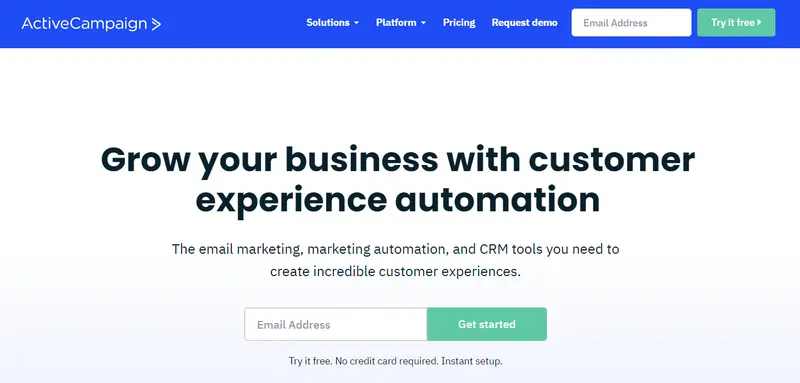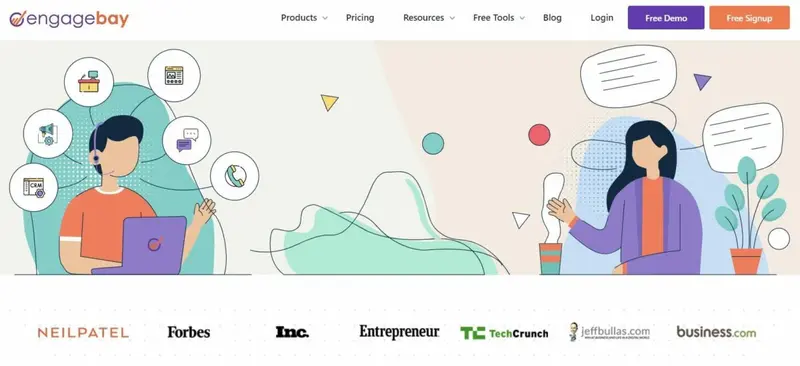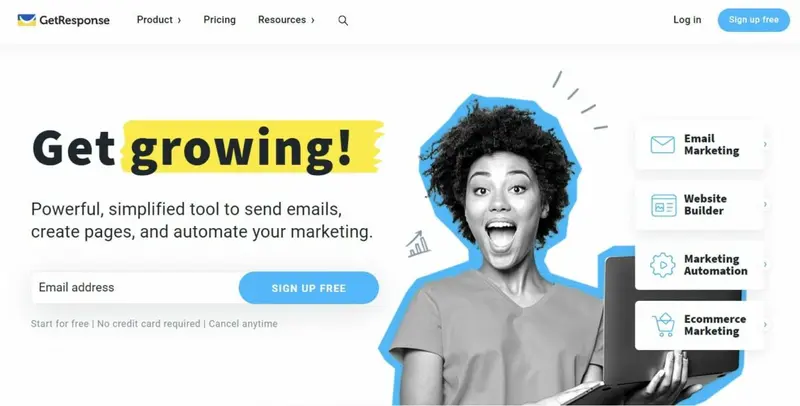HubSpot is one of the most established marketing platforms on the market. Considering that it’s had over 15 years to make a name for itself and grow its list of features, it doesn’t really come as a big surprise that it’s arguably the most well-known tool in its category. What might come as a big surprise, though, is its pricing. Sure, it offers various free services and tools, but if you want to sign up for one of its paid plans, it’s going to cost you.
It’s arguably its pricing, and not its lack of features, that have opened the door to other tools. If you’re a marketer or sales team in search of a possible alternative to HubSpot, you’ve landed on the right page. We’ve scoured the web to find out with which other tools marketing and sales teams have also had success with. Continue reading to learn more about seven other similar solutions that you can also keep in mind.
Top HubSpot Alternatives:
Why Should You Check Out HubSpot Alternatives?
Founded in 2006, HubSpot is arguably one of the most popular customer relationship management (CRM) tools available on the market. It’s trusted by more than 140,000 customers that include big brands like Trello, Suzuki, and Soundcloud. If you’re not familiar yet with its features, the chances are good that you’ve read one of their blog posts about marketing-related topics at some stage.
Their CRM platform is designed for scale and can help businesses to grow by making it easier for them to create remarkable customer experiences. Trusted by thousands of companies from across the globe, they offer powerful, yet intuitive, tools that can help with marketing, sales, customer service, content management, and website management.
One of the major attractions of HubSpot is that you can use the different products in the platform alone or together. For marketing automation, lead generation, and analytics, you can check out its Marketing Hub. For help with tasks related to customer service, like meeting scheduling and customer feedback, there are the Sales Hub and Service Hub. Then, to help you create content so that your customers will enjoy a more personalized experience, there’s the CMS Hub.
Here are some of the main pros and cons of HubSpot:
Pros of HubSpot
- It’s one of the most comprehensive platforms for marketing, sales and customer support.
- It’s relatively easy to use, considering its capabilities.
Cons of HubSpot
- It gets very expensive very quickly.
- The pricing lacks transparency, while the contracts lack flexibility.
- A/B testing is included only in its more expensive plans.
What Are the Top Alternatives to HubSpot?
- Brevo (formerly Sendinblue)
- Keap
- Freshdesk
- EngageBay
- ActiveCampaign
- GetResponse
- Wishpond
Seeing that HubSpot is such a comprehensive tool, it’s difficult to find a direct comparison. So, the following tools are great alternatives to some of the products offered by HubSpot. After all, HubSpot gives you the option to sign up for only the products that you’ll need instead of necessarily the whole platform.
Popular Alternatives to HubSpot
Founded 10 years ago in 2012, Brevo is an all-in-one digital marketing platform and, similar to EngageBay, mainly targets small to medium businesses. To help you with communication, it offers email marketing, SMS marketing, and chat. Then, to help you personalize your communication and interaction with your customers, it offers a CRM, transactional emails, and marketing automation. Lastly, to make sure that you have a big enough database to market to, it offers landing pages, sign-up forms, and Facebook Ads. Here are some of Brevo key features: If you compare these two tools’ paid plans, you’ll see that Brevo offers better value for money. The Starter package of HubSpot is similarly priced to Brevo Premium plan. Though, unlike this plan of Brevo that offers loads more features, like A/B testing, personalization, and phone support, HubSpot only includes these and other features in its more expensive Professional plan (and starting at about $900 per month, this plan is frankly out of reach for many businesses). This brings us to one of the major drawbacks of HubSpot… The jump between their entry-level plan and mid-range plan is huge. For the Marketing Hub, it’s basically $50 per month or $890 per month. On the other hand, Brevo email marketing appeals to various budgets, making it more accessible. Pricing: Brevo has a free plan, two subscription plans, and custom pricing for enterprise clients. Both the Starter plan (starting from $25 per month) and the Business plan (starting from $65 per month) come with unlimited contact storage. Though, the plans do cap the monthly email volume and expect to pay more if you want to increase your monthly email volume. If you’re specifically searching for a tool that can help you with automations, ActiveCampaign can be a worthy alternative to HubSpot. While many of the alternatives mentioned on our list already focus mainly on small and mid-sized businesses, ActiveCampaign also targets enterprise clients. Its easy-to-use tools make marketing and sales automation easy, helping you to concentrate on clinching more sales. Here are some of ActiveCampaign’s key features: ActiveCampaign offers sophisticated automation and personalization features, making it a solid solution and alternative to HubSpot, if you’re mainly looking for help in that area. It also offers hundreds of integrations which are always welcome. Price-wise it not only works out cheaper, but it also offers more pricing plans. Both tools, though, will help you to keep track of marketing and sales from a central place very effectively. Pricing: ActiveCampaign offers three subscription plans and a customized plan for enterprise clients. After a free, 14-day trial, pricing works as follows when billed monthly: Initially part of the Infusionsoft brand, Keap is an all-in-one CRM and sales and marketing automation engine that helps businesses to capture, organize, and nurture leads and ultimately boost sales. Other features included in its offering are email marketing, text marketing, reporting, and analytics. All in all, most of the features are easy to start using and it also offers a mobile app so that you can access your account from anywhere which helps to make the overall user experience more impressive. That said, if you do get stuck, every subscription includes a dedicated Customer Success Manager too. Here are some of Keap’s key features: Similarly to Brevo, Keap offers better value for money. Where HubSpot is aimed at enterprise clients, Keap chooses to focus on entrepreneurs and small businesses and the pricing reflects that. What makes Keap such an attractive alternative is that they offer ample support. From free migration to onboarding support to phone and chat support, your dedicated Customer Success Manager will see to it that you receive enough help learning their software and unlocking their features. Sure, HubSpot is a one-stop solution and can help you with all your marketing, but if you’re a small business Keap makes more sense. Pricing: After a free, 14-day trial, pricing works as follows: Freshdesk is one of the best customer service software tools that you can check out. Founded in 2010, it’s an award-winning, cloud-based customer service software that concentrates on cross-functional team collaboration. It offers a number of different products that include: With the help of its omnichannel engine, you can simplify your customer communication across various channels like social media, email, and chat. Trusted and loved by more than 150,000 businesses that include global brands like Honda, Cisco, and 7-Eleven, it can help you to deliver a much improved customer experience. Here are some of Freshdesk’s key features: If you’re specifically searching for a solution that’s comparable to HubSpot, you can check out its Freshsales product. It’s much more scalable than HubSpot, making it ideal for businesses that are still growing. The pricing is also more transparent (and affordable) and irrespective of the plan that you select, you’ll get access to support via phone, chat, and email during the week. As it can automatically assign leads to relevant team members on your sales team, it’s a great alternative if you work across various regions. What’s more, Freshworks also supports many other languages, making it a popular tool for small businesses that don’t necessarily operate mainly in English-speaking parts of the world. Pricing: After a free, 21-day trial, Freshworks offers a number of plans: All these prices are per agent when you choose to be billed monthly. EngageBay is one of the best overall alternatives to HubSpot, specifically for small and medium-sized businesses. It offers comprehensive marketing software solutions and a free unified CRM. Aimed at growing brands and startups, EngageBay was designed with the goal of being a more cost-effective alternative to HubSpot. Included in its impressive list of features are: marketing automation, a sales bay where you can organize email contacts and track deals, and help desk software. Here are some of EngageBay’s key features: The biggest difference between HubSpot and EngageBay is arguably the huge difference in price. In fact, according to EngageBay’s website, you can save as much as 90% without losing out on any features. EngageBay, for example, doesn’t charge any mandatory onboarding training fees. It also doesn’t have any yearly contracts, making it much easier to cancel. With EngageBay, you’ll also be able to add more contacts for less. So, unlike HubSpot that targets large enterprises, EngageBay is more up the alley of small businesses. Pricing: EngageBay has a free plan for up to 250 contacts and three subscription plans. The Basic plan costs $12.74 per user per month for up to 500 contacts. The Growth plan costs $42.49 per user per month for up to 5,000 contacts. The Pro plan costs $84.99 per user per month for unlimited contacts. What’s more, it also gives you the option just to pay for the pieces that you need instead of signing up for the whole stack. That said, there’s not much price difference and so it makes sense to sign up for the all-in-one solution. GetResponse is a great HubSpot alternative if you need help with autofunnelling and landing pages specifically. Loved by small as well as large businesses, and educational institutions, it’s a robust marketing tool that can help you with email marketing, website building, and marketing automation to mention only some of its features. One of the reasons why it is such a popular tool is that it includes a number of features to grow your list and convert them into paying customers. For example, its ready-made automated sales funnel creator (previously called Autofunnel) will do all the hard work involved in capturing new leads and nurturing them. Here are some of GetResponse’s key features: GetResponse was initially founded as an email marketing service provider but has grown into a comprehensive marketing tool that can take on the likes of HubSpot. Once again, price is a determining factor between the two, with GetResponse offering more affordable plans and flexible terms, making it the clear winner in this department. As mentioned, it’s a great alternative if you want to focus on landing pages specifically. Users have shared that they find GetResponse’s landing page builder easier to use. Another key feature that makes GetResponse an attractive option is its webinar software. Hosting a webinar can be a very good strategy to get more leads and if you’re interested in exploring this avenue, be sure to check out GetResponse. Pricing: GetResponse offers a free plan and three subscription plans. After a free, 30-day trial, pricing works as follows when billed monthly: Wishpond is a Canadian-based business that offers marketing-focused online business solutions. Their all-in-one marketing suite can help companies with lead generation, marketing, and sales conversion. While they mostly target small to mid-sized businesses, their clients come from a wide range of industries that include B2B, fitness, and eCommerce. To date, they’ve helped their clients to generate more than 70 million leads. Included in its long list of features are: Here are some of Wishponds’s key features: First things first, Wishpond doesn’t offer all the useful features included in HubSpot’s offering. For example, it doesn’t support live chat, which can be a very effective channel for marketing and customer service. On the other hand, Wishpond includes powerful A/B testing, which HubSpot includes only in its more expensive plans. If social media forms a key part of your marketing strategy, you’ll enjoy how well Wishpond works with social media. With it, you can create various social media contests and competitions that include photo caption competitions, sweepstakes, and video contests. It also supports paid ads on multiple channels, including social media. Pricing: Sadly, they don’t share any info about their pricing, which always makes you wonder…1. Brevo (formerly Sendinblue)
HubSpot vs Brevo
2. ActiveCampaign
HubSpot vs ActiveCampaign
3. Keap
HubSpot vs Keap
4. Freshdesk
HubSpot vs Freshworks
5. EngageBay
HubSpot vs EngageBay
6. GetResponse
HubSpot vs GetResponse
7. Wishpond
HubSpot vs Wishpond
Wrapping Things Up
To find the best tool to help you with your marketing, sales, and customer service, you’ll need to do your homework thoroughly. And, by homework, we don’t just refer to checking out the available tools online, but also figuring out what exactly it is that you need the platform to do. As a matter of fact, your own business (and its needs) should be your starting point.
You see, there are many comprehensive solutions available, but there’s often a huge price difference in the different subscription plans. So, if you don’t know what you need help with, you run the risk of paying for a bunch of features that you’ll hardly ever use. This can easily happen with HubSpot. Make no mistake, there’s a reason why it’s one of the best all-in-one marketing and sales platforms. However, its features might just be overkill and there’s a very good chance that one of these alternatives on our list will fit your business needs and budget much better.
Frequently Asked Questions
What is the best alternative to HubSpot?
These are the best HubSpot CRM alternatives:
- EngageBay
- Brevo (formerly Sendinblue)
- Keap
- ActiveCampaign
- GetResponse
- Freshdesk
- Wishpond
Which CRM is better HubSpot or Salesforce?
Both HubSpot and Salesforce have essential CRM functionality, from sales forecasting and email marketing to lead management. Salesforce has more customization features as well as stronger analytics and advanced features. HubSpot is more user-friendly and budget friendly.
Is Salesforce a competitor to HubSpot?
Salesforce is a competitor to HubSpot as they are both CRM platforms. Both platforms offer CRM along with other tools for front office teams, including sales, marketing, content management, and service tools.
Is HubSpot CRM actually free?
HubSpot is really free – and the free version has a solid number of features. When you pay for the higher tiers, you can get increased functionality.














